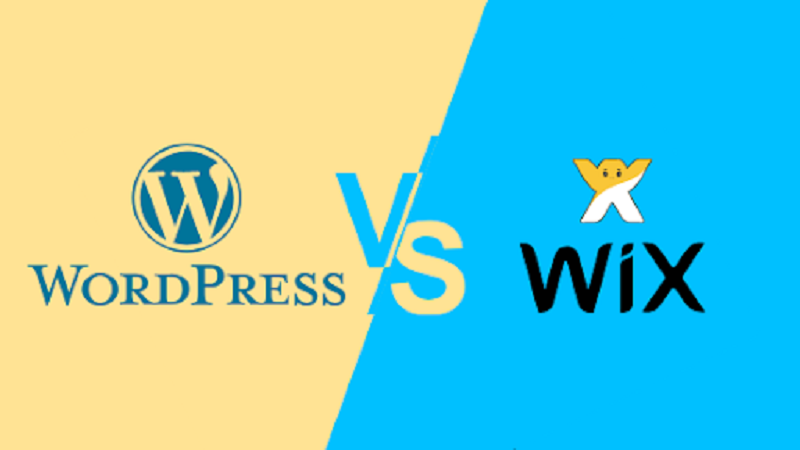 Source: Create a Pro Website
Source: Create a Pro WebsiteWordPress vs Wix
Website?
Every great website is born out of an idea.
That idea might be a business, or perhaps it’s to create a digital space to display the results of a creative passion project. Whatever it may be, you’re probably caught up in one of the more delicate internal debates creators have to grapple with: WordPress vs Wix.
A quick few Google searches probably helped you weed out many of the other website builders on the market. And after digging a little deeper, you’re likely aware that both WordPress and Wix are great platforms.
WordPress is no small player in this field, as around 35% of the world’s websites are powered by the platform. There has to be something good about it to attract such a large crowd, right?
However, Wix has been growing in popularity ever since it splashed into the market in 2006.
To help you put an end to your WordPress vs Wix debate, we’ll be taking you through the most notable pros and cons of both platforms so that you’ll be able to make an educated choice between the two.
We’re talking about your first website, after all, and we all know how important it is to start off on the right foot.
Initial Difference and Similarities
Before diving into serious details, we thought it would be prudent to explain one of the primary differences between these two platforms.
If by the time you get to the end of this section and still can’t decide which is the superior contender for your first website, then we’ll start digging into the nitty-gritty.
Compared to Wix, WordPress takes noticeably longer to set up, and the reason for this is that Wix is a bit simpler, allowing you to simply sign up for an account and begin website construction immediately.
Think of it as a plug-and-play solution.
With WordPress, before you get to design any part of your website, you first have to sign up for a web hosting service and purchase a domain name.
After that, you have to install WordPress with your web host and link your domain name.
Onboarding aside, there are a lot of similarities between WordPress and Wix that you should be aware of.
For one, both can power your site effectively, and both give you the ability to build a modern digital space with beautiful and customizable themes. Other important similarities are:
- Ability to optimize your site for SEO
- Site analytics capabilities
- Responsive display functionality
- The ability to utilize drag-and-drop page editors.
- Provide a suite of plugins that add features to your site
So while we’ve already laid out one of the most significant differences between these two platforms, ending the Wix vs WordPress debate will require a bit more consideration.
Initial set-up time and ease of use may be valuable, but we’re interested in figuring out which platform will be best for your first website in the long run.
So without further ado, let’s start digging into some of the finer details.
Which Makes It Easier to Start Building Your Website?
 Source: Pexels
Source: PexelsAs we mentioned earlier, Wix will let you join their platform and instantly start building your website with just a few clicks.
WordPress requires that you sign up for web hosting and purchase a domain name–and we get that this may sound like a lot of prep work just to get going. Still, you should know that most modern hosting providers have made the process fairly easy and uncomplicated.
In fact, the prep could take you less than 10 minutes to get done.
Once you’ve got WordPress installed, you’ll be ready to decide on the theme for your first website.
WordPress offers a wide selection of free and paid themes to choose from. Some even come with content already on the site, so instead of adding in all the designs and site navigation yourself, you simply need to edit the website’s pre-filled content.
That being said, when it comes to pure ease of use, Wix wins this one.
Which Platform Offers More Customizations and Flexibility?
 Source: Pexels
Source: PexelsOnce you’ve got your website up and running, you’ll want to customize it so that you can give it your own unique look and deliver a quality visitor experience.
You may need your platform to be capable of integrating with common software solutions like HubSpot, TypeForm, and analytics tools. You’ll also want to be sure that editing the design of your pages doesn’t feel like pulling teeth.
In this regard, WordPress is the clear winner, and here’s why.
If you want to add plugins or extra features to your Wix site, you’ll be limited to using what Wix provides on their App Market.
While this is more than what other plug-and-play website builders give you, it’s still nothing compared to WordPress’s seemingly bottomless list of plugin offerings.
Wix is also limited in its ability to add custom code to your website, so if you’re a developer, that will probably be a dealbreaker.
WordPress, on the other hand, is a powerhouse for plugins and custom code capabilities. Boasting over 55,000 different plugins for you to choose from, the possibilities for what your first website could become are limitless.
It doesn’t matter if you want to use your site to display social media, feature fun online quizzes, or simply function as a portfolio–there are plugins to accommodate your every need.
One of the nice things about Wix is that it comes with a built-in drag-and-drop editor.
WordPress does not.
But that functionality is just a download away! Popular Page-Editor plugins like Elementor and Prezi let you build and edit your website’s design with as much ease as if you were using Wix.
And if you or a hired developer needs to add custom code to your website, you’ll both be able to easily do that with WordPress on it’s own, or if you need extra help, there are other plugins that make that feature more accessible.
Ecommerce Capabilities
 Source: Pexels
Source: PexelsIf you want your first website to be capable of selling products, you’ll need ecommerce capabilities.
WordPress may not come with this capability right out of the box, but via the magic of plugins like WooCommerce, you’ll be able to start selling your products in no time.
In fact, ecommerce is one area that really highlights how convenient it is to use WordPress as a platform.
It gives you access to tools and solutions that let you do anything related to running an online store.
Need to process credit cards? Manage a diverse inventory? WordPress will be able to handle those and other relevant tasks.
Given that this is your first website, you may not know what ecommerce features you’ll actually need, but the beauty of the plugin marketplace is that you can find what you need when you need it, which allows you to rest easy knowing that your solution is out there.
Wix is also great for ecommerce so long as you’re primarily using it for a small business.
Its ecommerce offerings are able to handle all the essential tasks like taxes and shipping and sales tracking. That being said, if you want to scale your online business at some point, you’re going to want a platform with greater functionality.
In short, WordPress takes this round by a landslide.
Differences in Cost
Both Wix and WordPress offer a selection of payment options, but for the sake of comparison, we’re just going to examine the annual costs of each platform.
Why the annual costs? Because when you buy your domain name, you keep it for at least a year. It doesn’t make much sense to have a domain name for 12 months while only having a website for a few.
Not to mention that the annual plan is also cheaper in the long run.
Wix’s most popular payment option is their Annual Unlimited Plan, which goes for $12.50 per month, totaling at $150 per year. Keep in mind that this doesn’t include any added costs for different apps you may need to purchase later on for added features.
WordPress is open-source software that’s free for anyone to use, but don’t think you won’t have to open up your wallet. The cost comes with the hosting provider. There are many to choose from, but there two in particular that are widely popular: Bluehost and Hostgator.
Bluehost starts at $2.95 per month, landing you at an annual cost of $35. It also comes with a free custom domain name.
Hostgator starts at $8.95 per month and $107.40 per year.
The evidence is clear. When it comes down to costs, WordPress wins.
To Sum It All Up
One of the comforting aspects of website building is that your first doesn’t have to be your last. If you choose Wix or WordPress and later decide that one might not be for you, there’s always the option to make the switch.
In the event that your first website doesn’t need many bells or whistles, then you may actually prefer to go with Wix for its simplicity and ease-of-use.
WordPress is the clear choice if you want to create a website for business or need something with a bit more power behind it.
Its flexibility and greater functionality, paired with its massive and growing ecosystem of plugins, enables the platform to scale with your projects as needed.
******
 Source: Create a Pro Website
Source: Create a Pro WebsiteHey, I’m Dale! I’ve helped tens of thousands of people just like you from around the world build beautiful blog, portfolio, and business websites with our easy to follow guides and tutorials over at CreateAProWebsite.com.
